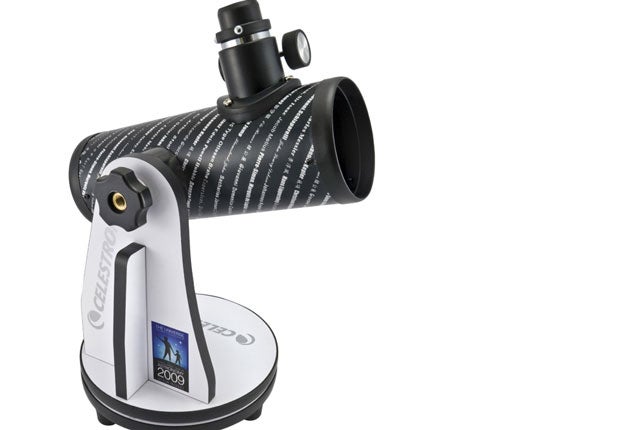Telescopes: Eyes on the skies
The surprise must-have on this year's Christmas lists isn't a hi-tech toy, it's a telescope. Paul McKenzie finds out why children and stargazing are natural partners

And the shopping experts said it was all going to be about consoles, games and gadgets this Christmas. What children wanted, no, craved were games that gave them a Minority Report moment; where they become the controller and have their image reflected back out at them from their 42-inch flat-screen. But then what do experts know? The sleeper hit this Christmas offers a different kind of magic – the magic of the heavens, by way of the telescope. John Lewis, which always gives a good mercury reading of the trends at Christmas, has reported a 148 per cent rise in the sales of 'scopes. It would be foolish to read into this that children are turning their backs on games consoles, toy robots and Disney dolls, but the figures are interesting.
Mike Khalfey, buyer for John Lewis, believes the upward trend in telescopes dates back to 2009, International Year of Astronomy. Television has also had a hand in accelerating sales. BBC2's Wonders of the Solar System gained a loyal and passionate following and made Professor Brain Cox a household name. Mr Khalfey believes a new generation are enjoying the simple pleasures that gazing through a telescope bring. "Children enjoy looking at the night's sky and there is always something exciting going on up there", he says.
Dr Marek Kukula of the Royal Observatory in Greenwich says he's noticed, "many more children, who appear to have pestered their parents to bring them along," coming through the doors. Dr Kukula says this upsurge in interest isn't just down to the TV. "Children like to ask questions. Looking out at the night sky, their minds wander; they become inquisitive and seek something that a computer game can't deliver. They want to send their mind on journey."
There are some truly spectacular sights in space that beat anything a 3D Hi-Def TV could deliver. Dr Kukula explains: "Jupiter out in the southern sky is looking pretty spectacular at the moment and anyone with a decent telescope and a star chart can pop into their back garden and see it."
And there can be little doubt that the recent meteor that exploded over Britain and lit up the skies from Somerset to Aberdeen was a sight to behold. A warm coat, a cup of hot chocolate and an imagination let loose. Now there's a beautiful thing.
What will thrill most parents in these times of austerity is that price-wise, this new fad compares favourably. Telescopes at John Lewis start from £39.95, there are numerous star charts freely available on the internet and a vast array of almanacs and astronomy books to be had.
But, as with every new "cool" moment, the question hanging in the air is, will this last? Dr Kukula believes star-gazing is here to stay: "It's a fun, social hobby, but above all it sparks an interest that stays with you." The buzz has certainly got the BBC excited. It has created a new star-gazing vehicle for Professor Cox, the show Stargazing Live airs in January and will feature Jonathan Ross learning how to use a telescope. The Royal Observatory will also be looking to increase its activities for the public in the New Year to make room for the new kids with their new "toys".
Dr Kukula offers this advice to any parent braving the winter chills in the hope of landing one of these objects of desire: "Don't get too obsessed by the amount of magnification – extremely high magnification can actually spread the image out too much and make it harder to see. The size of the aperture, where the light comes in, is the important thing. This determines how much light the telescope gathers so a larger aperture allows you to see fainter objects. A good rule is that the maximum magnification should be around twice the telescope aperture in millimetres (so a 100mm scope should go up to a magnification of 200)." So, if your child starts asking questions that you haven't a clue how to answer, fear not – head over to your local specialist telescope shop.
All run by enthusiasts, they will be happy to provide friendly advice to beginners.
Subscribe to Independent Premium to bookmark this article
Want to bookmark your favourite articles and stories to read or reference later? Start your Independent Premium subscription today.

Join our commenting forum
Join thought-provoking conversations, follow other Independent readers and see their replies